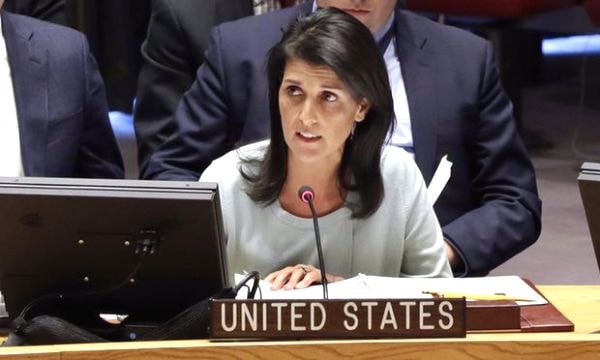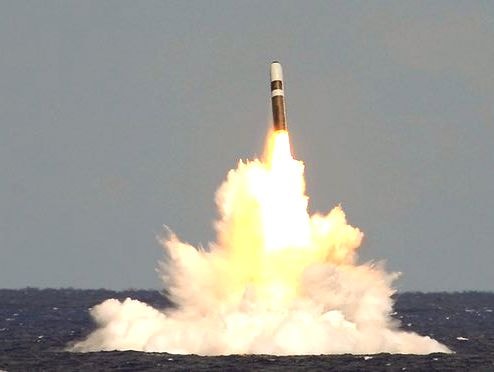Against nuclear weapons, major countries stay out of the game
(Baonghean) - This week, at least 113 countries gathered at the United Nations headquarters to discuss a ban on nuclear weapons, but they faced opposition from the United States - the country leading the coalition to boycott the talks. This country's representative also declared that the world would not be safe if the US did not have nuclear weapons.
The conference stems from a United Nations resolution calling for a global conference to find a legal process to prevent nuclear weapons, which was adopted last October.
Of these, 123 countries, the majority of which are members of the United Nations, voted in favor of the resolution. Except for nuclear-weapon states such as the United States, China, France, Britain, Russia, India, Pakistan, Israel, and North Korea.
 |
| US Ambassador to the United Nations Nikki Haley. Photo: AP |
US Viewpoint
Nikki Haley, the US ambassador appointed by Donald Trump to the United Nations, declared outside the meeting that the world would not be safe if the US did not possess nuclear weapons.
“I am a mother, a wife, a daughter. I always think of my family first. My duty is to protect my people and my country. To ensure their safety, to maintain peace. We want a ban on nuclear weapons, but today, we cannot honestly say that we can protect our people by allowing bad people to possess them, while those of us who are trying to maintain peace do not have them,” she stressed.
Haley also noted that nearly 40 countries are boycotting the conference, and that countries like North Korea and Iran may be happy to support the ban, while they have no intention of complying with the treaty. A month after winning the US election, Mr. Trump said he wants to increase the size of the nuclear arsenal, reversing decades of reductions. Mika Brzezinski, host of MSNBC's "Morning Joe," said Mr. Trump once told her: "Let's make it an arms race and we'll outdo everyone."
France and Britain, nuclear-weapon allies, have also spoken out against the talks, saying they will not help disarm nuclear states.
Australia's position
Among the non-nuclear weapons states, Australia is the most vocal opponent of the treaty. Australia has always maintained that, as long as nuclear weapons exist, it must rely on the United States for nuclear protection. However, Australian political sentiment appears to favor negotiations. The Australian Senate has passed a motion asking the Government to join the talks, and polls show that nearly three-quarters of Australians want the country to be part of the nuclear arms talks.
 |
| A test launch of a Trident II ballistic missile from a submarine in the Atlantic Ocean. Photo: Lockheed Martin |
Responding to the move, Labor Senator Lisa Singh argued that Australia had a moral and legal obligation to prevent nuclear weapons, the only weapons of mass destruction not banned under international law. “There are currently about 15,000 nuclear weapons globally, which pose a serious threat to humanity,” Ms Singh said.
In response, the Prime Minister's assistant, Senator James McGrath, told the Senate that: "Australia shares the international community's goal of a peaceful, nuclear-weapon-free world" but not by participating in United Nations negotiations.
He argued that the deterrence treaty would not advance nuclear disarmament, risking undermining the nuclear non-proliferation treaty by creating ambiguity and confusion through parallel obligations and increasing the divide between nuclear states and the rest.
A poll conducted this month with 1,050 Australians asked, “The United Nations has begun negotiations on a treaty to ban nuclear weapons. Should the Australian government support these negotiations?” 73% of respondents said they supported it, 10.6% said they did not, and 15.5% said they could.
Existing treaties such as the nuclear non-proliferation treaty have failed to reduce nuclear arsenals, and Australia should adopt a new plan to eliminate them, according to Gem Romuld, coordinator of the International Campaign to Abolish Nuclear Weapons.
At the same time, he said that while other weapons of mass destruction such as chemical or biological weapons and anti-personnel mines are banned, this is a historic moment to be able to put nuclear weapons on the same banned list as other weapons of mass destruction.
In fact, without the participation of nuclear-weapon states, the treaty is considered a failure. However, proponents say that a ban on weapons would create a moral conviction for nuclear disarmament, creating an international norm prohibiting the development, stockpiling and use of nuclear weapons. In addition, non-nuclear-weapon states, increasingly frustrated with the current nuclear proliferation, have expressed support for a new ban.
Phan Vu
| RELATED NEWS |
|---|

